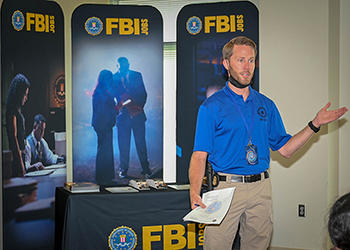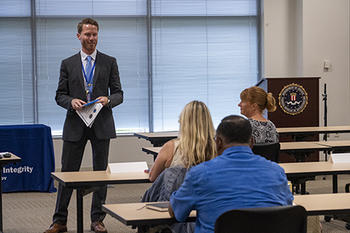When discussing diversity, people often begin and end with physical characteristics. Perhaps more importantly, though, it also refers to the different skillsets, worldviews, and perspectives individuals hold. To this day, Michael Hynes, BS Marketing ’03, remembers how much he enjoyed interacting with classmates and faculty who were different from him. “A valuable part of my education was being exposed to new ideas and thought processes, challenging me to think more critically,” he says.

Hynes is now a supervisory special agent in the FBI, overseeing recruiting in Washington, D.C., and Northern Virginia. With more than 100 different positions available at the Bureau, they too benefit from a diverse and inclusive workforce.
Hynes got his start in the FBI as an intern during his junior year at Mason. “After the attacks on 9/11, I was motivated to be part of something bigger,” he says. “With my father-in-law in enforcement at the time, you could say it was a family value.” While an undergrad, Hynes made good use of the network he established through his membership in the professional business fraternity Delta Sigma Pi. “By networking with the fraternity’s active alumni, I learned about many internships including the Honors Internship Program at the FBI,” he says. From that point forward, the Mason business alumnus climbed through the ranks, serving in numerous FBI offices around the country as an intelligence analyst and special agent prior to his current supervisory position.

What advice would Hynes give to a student interested in a career with the FBI? “Find your own niche and study what you’re passionate about,” he says. “The FBI covers many different fields making just about any area of expertise applicable, whether it’s as an attorney, nurse, forensic accountant—the list goes on.” In fact, many professionals enter the FBI after years spent establishing themselves in the private sector. Similar to how different backgrounds benefit Mason, these diverse skillsets significantly strengthen the Bureau. Hynes also emphasizes that to ensure their workforce more accurately represents the diverse communities that the FBI serves, they have increased their recruiting efforts to attract more female and minority applicants.
By forcing us to question our own deeply held beliefs, diversity molds individuals into more open-minded and analytical thinkers. This very Mason trait makes the university’s students highly sought after by employers. It also makes an organization like the FBI much more productive than if everyone was like-minded. The stated vision of the FBI is to “stay ahead of the threat,” and when varied strengths, viewpoints, and experiences are incorporated into the team, the success of that vision multiplies exponentially.
The FBI is always looking for new recruits in a wide range of fields.
